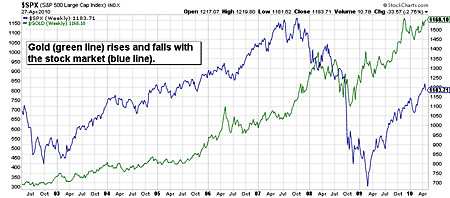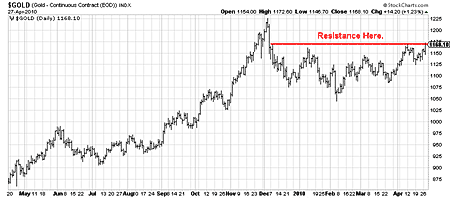What the Greek crisis means for gold
Greek debt has been officially declared 'junk', sending stockmarkets tumbling. And the fear is spreading. The only assets that are rising are the US dollar and gold. So is gold finally living up to its 'safe haven' billing? Dominic Frisby looks at what this 'perfect storm' means for the price of gold.
Get the latest financial news, insights and expert analysis from our award-winning MoneyWeek team, to help you understand what really matters when it comes to your finances.
You are now subscribed
Your newsletter sign-up was successful
Want to add more newsletters?

Twice daily
MoneyWeek
Get the latest financial news, insights and expert analysis from our award-winning MoneyWeek team, to help you understand what really matters when it comes to your finances.

Four times a week
Look After My Bills
Sign up to our free money-saving newsletter, filled with the latest news and expert advice to help you find the best tips and deals for managing your bills. Start saving today!
Stock markets collapsed yesterday in dramatic fashion as credit rating agency Standard & Poor's (S&P) lowered Greece's credit rating from BB+ to BBB+. In other words, Greek debt is now officially junk (according to S&P at least, and the other agencies may not be far behind).
S&P warned that if Greece restructures her debt, bondholders could recover as little as 30% of their initial investment.
No wonder investors panicked. Yields on ten-year Portuguese bonds jumped 48 basis points (that's 0.48 percentage points), while Irish yields surged despite the widespread praise the country's enjoyed for its cutbacks. Both the euro and the pound fell against the dollar. Stock markets went into freefall, with the S&P 500 falling by almost 3%. Even my uber-bullish broker was buying puts.
MoneyWeek
Subscribe to MoneyWeek today and get your first six magazine issues absolutely FREE

Sign up to Money Morning
Don't miss the latest investment and personal finances news, market analysis, plus money-saving tips with our free twice-daily newsletter
Don't miss the latest investment and personal finances news, market analysis, plus money-saving tips with our free twice-daily newsletter
The only thing to rise was the US dollar.
Oh, yes. And gold...
Gold hasn't been behaving like a safe haven
Gold is billed as the safe haven investment that people fly to in times of panic. But over the last ten years it hasn't really worked like that. Broadly speaking, since 2002, gold has risen and fallen with the stock and commodities markets. It has not been the 'alternative investment' it's made out to be.
Recommended readingA beginner's guide to investing in goldHow to play a struggling euro
In 2001 gold rose (from a multi-year low) as stock markets fell, but then in 2002 they synched up. Since then they have risen and fallen in tandem. They enjoyed bull markets from 2002 to 2007. They corrected together in May 2006. Gold carried on rising after the stock market made its top in 2007, but then both fell during the credit crisis of 2008.
Gold, however, did not fall by as much; it made its low earlier than the stock market (this is the action you'd expect from an asset that's in a long-term bull rather than bear market), but by March 2009 they were back in sync and rising together again.

But now it's finally doing what it's supposed to
But, yesterday, we saw something different. As Greece was downgraded, stocks collapsed but gold actually shot up, by some $25. It was finally doing what it's 'supposed to'.

- Why UK property prices are going to fall 50%
- When it will be time to get back in and buy up half price property
And it shouldn't be any great surprise. This is the perfect storm for gold. Unlike the 2008 credit crisis, where the problem was largely one of private debt and liquidity drying up, now the issue is sovereign debt. This is a different beast altogether. And the fear already seems to be spreading. Portugal is next. But are the finances of Britain or France or, for that matter, the US in markedly better shape?
In these circumstances, where's left for money to flee to? Gold's unique selling point is that it is nobody else's liability. That's what should make it an attractive buy when the world's financial system comes under this sort of stress.
It's also worth noting that other 'hard assets' such as oil, silver and base metals actually sold off yesterday. Gold and the US dollar were the assets that money fled to. I have pointed this out before. It is unusual, but it is possible for gold and the US dollar to rise together.
Did gold break free yesterday?
One day does not a market make, but there is a good chance that yesterday will mark a major change in trend. It could be a top in stock markets though I'm wary about making that call again. But if it is the day that gold finally breaks free, gold has to get above $1,170 an ounce and stay above that level, as the chart below shows.

Once we are through this resistance, gold can make an assault on its old highs and beyond.
Our recommended article for today
The 'Fed model' is warning us to be careful
The 'Fed model' of stock valuation is used by many big investors. And now it's saying that it's time for extreme caution. Theo Casey explains what it is, how it works - and why you should listen to it.
Get the latest financial news, insights and expert analysis from our award-winning MoneyWeek team, to help you understand what really matters when it comes to your finances.
MoneyWeek is written by a team of experienced and award-winning journalists, plus expert columnists. As well as daily digital news and features, MoneyWeek also publishes a weekly magazine, covering investing and personal finance. From share tips, pensions, gold to practical investment tips - we provide a round-up to help you make money and keep it.
-
 Can mining stocks deliver golden gains?
Can mining stocks deliver golden gains?With gold and silver prices having outperformed the stock markets last year, mining stocks can be an effective, if volatile, means of gaining exposure
-
 8 ways the ‘sandwich generation’ can protect wealth
8 ways the ‘sandwich generation’ can protect wealthPeople squeezed between caring for ageing parents and adult children or younger grandchildren – known as the ‘sandwich generation’ – are at risk of neglecting their own financial planning. Here’s how to protect yourself and your loved ones’ wealth.

